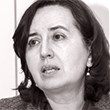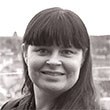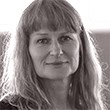Program and slides
We have now published all speaker’s slides. We do not take responsibility for the content, or the accessibility of that content.
Day 1, Tuesday April 4
08.00 - 09.00 General Track
Introduction for beginners (outside of the conference)
If you feel the Accessibility Days are a bit too advanced, we offer a short run through of the basics of accessibility just before the event starts. This introduction to web accessibility in 60 minutes is your oportunity to learn the most important things – very fast!
Price: 160 EUROS per person.
08.30 - 09.30
Welcome to register and have a cup of coffee before the conference
09.30 - 09.45 General Track
Conference opening by moderators
The moderators of the Accessibility Days present themselves and opens the conference.

Andreas Cederbom is Head of Analysis at Funka. He has a long experince in international accessibility work and is one of Funka’s experts on requirements and assistive technology.

Lena Drevsjø is accessibility expert at Funka’s Oslo office. She performs audits and gives support to our clients around universal design.
09.45 - 10.15 General Track
EU legislation and policy work on web accessibility
Many things around accessibility are happening at the same time in the EU right now. This presentation will provide an overview of the accessibility legislation and policies in the EU focusing on the European Accessibility Act. The session will explain the legislative process and also how the implementation works. Finally the role of accessibility standards and their use in legislation will be explained.

Inmaculada Placencia-Porrero is Senior Expert in the Unit for Inclusion of Persons with Disabilities in the European Commission. The unit is in charge of the coordination of the European policies for persons with disabilities and responsible for the European Disability Strategy 2010-2020 and the implementation of the UN Convention on the rights of persons with disabilities at EU level. Inmaculada is graduated in Physics and Computer Science and she joined the European Commission in 1991 and has been focused on accessibility work ever since.
Inmaculada Placencia-Porrero, presentation, powerpoint (827 kb), opens in new window
10.15 - 10.45 General Track
The Web Accessibility Directive is being implemented in all member states – detailed insights from the Swedish government on how
The European Commission has agreed on a directive for web accessibility, which is currently being converted into national legislation in all Member States, including Sweden. How is this work being done and what does the schedule look like? The Web Accessibility Directive is a so-called mini-harmonization directive. What does that mean?
Henrik Ardhede is a trained lawyer who has previously worked with digitization issues in the Swedish Courts Administration. Currently he is employed as a subject matter expert at the Ministry of Finance. His main task at the department is that he and a colleague are responsible for the investigation on how to implement the Web Accessibility Directive in Sweden.
Henrik Ardhede, presentation in Swedish, powerpoint (617 kb), opens in new window
10.45 - 11.30 General Track
When accessibility is no longer voluntary work
Many EU Member States have not had any legislation on web accessibility before, but this is changing when it comes to procurement, internal and external interfaces. What does this mean in practical terms for website owners who have to comply with the requirements? How can you prepare - and is it possible to turn the regulations into something positive?

Susanna Laurin is CEO of Funka and an expert in the Subgroup to the European Commission on the Web Accessibility Directive. She is the representative of the international association of accessibility professionals, IAAP, in Europe, and active in a number of national and European standardization committees. Among other things, she has been active in the development of the EN 301 549.
Susanna Laurin, presentation in Swedish, powerpoint (8,9 Mb), opens in new window
11.30 - 12.30
Lunch is served on both floors
12.30 - 13.10 Content Track
Accessibility pep talk
A beautiful presentation full of good examples. Through the years, Funka has helped hundreds of organizations with their work on accessibility. We have encountered many successful projects and projects that changed the entire organization. In this inspirational lecture we discuss a variety of practical examples of how small changes in work methods and increased user involvement can make a big difference and lead to a more accessible and inclusive interface.

Moa Glantz is an accessibility and UX-expert at Funka. She examines interfaces, perform user testing and provides support in terms of technical and pedagogical accessibility and interaction design.

Hampus Sethfors is an accessibility and UX-expert at Funka. He is a popular trainer with extensive experience in assistive technology and apps. Hampus provides support in terms of technical and pedagogical accessibility, conducting analyzes and user tests.
Moa Glantz and Hampus Sethfors, presentation in Swedish, powerpoint (71,2 Mb), opens in new window
12.30 - 13.10 Technical Track
It will happen soon: WCAG 2.1 is on the way!
An update to WCAG 2.0 is in the works and the new version, WCAG 2.1, is expected to be published mid-2018. The development of WCAG 2.1 will focus on existing gaps in WCAG 2.0, particularly issues related to touch interfaces, small screen sizes, and issues impacting users with low vision and cognitive disabilities. This talk will share updates on the progress, what is expected to stay the same and what may change, and what the future after WCAG 2.1 may look like.

Andrew Kirkpatrick has worked with the accessibility of Adobe since 2005, he is currently responsible for overall strategy and management regarding Adobe's accessibility work, including standards and programs. Along with Joshue O Connor, Andrew is Chair of the WCAG Working Group. The work means that he leads the working group, coordinates the various sub-groups and sets the direction for future development. Andrew is a member of the board of the International Association of Accessibility Professionals, IAAP.
Andrew Kirkpatrick, presentation, pdf (157 kb), opens in new window
13.15 - 14.00 Content Track
Illustrating the point: How to use images as an effective communication tool
Creative use of illustration, icons, and other images can make web content more engaging and dynamic. How can you ensure these graphics convey consistent meaning to a diverse audience? Using principles from comics and universal design, this presentation will explore challenges and techniques for effectively incorporating images in a way that resonates with audiences across varying cultural contexts, languages, and abilities.

Cordelia McGee-Tubb is an accessibility-focused web developer and designer, most recently leading Dropbox’s accessibility initiatives. An advocate for digital literacy, Cordelia teaches computer and internet skills to senior citizens. She holds a Master of Fine Arts in Comics, is working on her first comic book, and also collects hats shaped like food.
Cordelia McGee-Tubb, presentation, pdf (6 Mb), opens in new window
13.15 - 14.00 Technical Track
How do you use the latest technology in the best way possible?
HTML5, script and WAI-ARIA are powerful tools that can create sensational interfaces. They are also packed with accessibility enhancing technologies. Nevertheless, or perhaps because of it, there are plenty of examples on how modern technologies becomes an accessibility barrier despite developers moving in with a great deal of enthusiasm. Funkas experts will break down the problems and show good examples.

Glenn Ivar Husom is an accessibility and UX-expert at Funka. He works with interaction design, accessible PDF-documents, user tests and review of technical and pedagogical accessibility. Glenn keeps feeding the office with wonderful cookies and has competed as pastry cook in Norwegian TV.

Torbjørn Helland Solhaug is an accessibility and UX-expert at Funka. He provides support in terms of technical and pedagogical accessibility, tests interfaces and participates in research projects. Torbjørn leads Funkas longtime support assignment with ULOBA and is a popular lecturer.
14.00 - 14.15
Coffee break, on both floors
14.15 - 14.55 Content Track
Can a UX-designer ensure good UX?
Managers, project owners and project leaders is finally starting to understand the value of UX competence. But it is not enough to let the UX-designer take care of everything related to the interface. Good UX is all about the big picture, and there are many parts that must work together. It may be sufficient that a seemingly small part fails, to make the UX poor, despite the fact that everything else seem right. In this lecture, you will learn how you can avoid pitfalls and ensure that the result is just as good as you want it to be!

Oskar Gustafsson is an accessibility and UX-expert at Funka. He is a popular project manager and leads the interaction design team at Funka in web development projects and performs workshops and develops concepts. He also manages the network of local governments lead by Funka.
Oskar Gustafsson, presentation in Swedish, powerpoint (26,7 Mb), opens in new window
14.15 - 14.55 Technical Track
Building a Practice of Accessibility UX Design
At Facebook, we talk about scaling accessibility. We expect the influence of our team to grow faster than the size of our team. Through process and tools, we push responsibility for accessibility support to product builders so that our team can focus on innovating. In the time we win back, we are shifting accessibility from remediation work to UX design. And the next version of ARIA gives us tools to improve page navigation and endless list traversal.

Jesse Beach's technology career started in linguistic research, shifted to UX design and then landed solidly in front end development. At Facebook, she channels her energies into building rock solid, beautiful and accessible interfaces. And whenever possible, Jesse staunchly advocates for diversity and inclusion in technology.
Jesse presented on the following topics:
Description of the LogicalGrid component (opens in new window)
Other projects (the links below opens in new window)
https://github.com/evcohen/eslint-plugin-jsx-a11y
https://github.com/facebook/jscodeshift
Concepts for ARIA (the links below opens in new window)
https://www.w3.org/TR/wai-aria-1.1/#feed
15.00 - 15.40 General Track
User-driven innovation creates good accessibility
There are great opportunities for the public sector to drive strategic IT issues with innovative approaches. For digital services to be effective, both external and internal perspectives are required. Within the Stockholm County Council, this is done in particular by inviting both patients and healthcare professionals to contribute early in design and development. In this way, innovation in digital services is based on user needs and support internal operations.

Daniel Forslund is a councilor for the Liberal party in the Stockholm County Council. As Sweden's first Innovation councilor, he has a political responsibility for many of the health care issues of the future, such as ICT development, medical devices, eHealth, patient-oriented services and innovation of healthcare practices, organization and management. Daniel was formerly chief strategist at the Swedish innovation agency VINNOVA, where he led the Agency's efforts to strengthen the capacity for innovation in the public sector. Before that he worked for almost 10 years at the Ministry of Social Affairs, where he was responsible for developing and implementing the Government's National Strategy for eHealth.
Daniel Forslund, presentation in Swedish, powerpoint (23 Mb), opens in new window
15.40 - 16.00 General Track
Surprise
Following tradition, we offer a surprise after the first day’s seminars. As usual, we dare to promise that it will be a first time for everyone!
16.00 - 18.00 General Track
Networking and exhibition
Welcome to our exhibition with stands where you can try different assistive technologies, talk to end users or ask our experts everything you want to know about accessibility. Or, you can just enjoy the view and relax with sparkling wine and canapés while networking with other participants.
Day 2, Wednesday April 5
08.00 - 08.30
Welcome to register and have a cup of coffee before the conference
08.30 - 09.05 General Track
Accessibility is Changing the World
Efforts being made in the public and private sector to assure accessibility for all are actually changing the world. This session will show how ICT Accessibility supports global change in everything from technical solutions to real inclusion. Accessibility work adds value to IOT, Smart Cities, Robotics, 3D Printing and Wearables. This way, innovation in accessibility can provide increased possibilities in social inclusion, employment and education opportunities.

Debra Ruh focuses on global accessibility issues and human rights, not least through her assignments for the UN agency G3ict on emplyment. Debra is a co-founder of AXSChat, the world's largest twitter chat with over 1 billion tweets. She is a board member and strategic advisor to several international organizations and is a recognized speaker.
Debra Ruh, presentation, powerpoint (18 Mb), opens in new window
09.05 - 09.45 General Track
Government and self-assessment? It can work!
In 2014-2015, New Zealand Government agencies self-assessed their websites for accessibility. This was a first step toward regular monitoring and reporting. Agencies found it challenging, and the results weren’t perfect, but the project was nevertheless a success. How were agencies, with their varying expertise, supported in testing accessibility? How reliable and useful were the results? What made the whole thing worthwhile? How have the outcomes informed our next steps?

Jason Kiss is Senior Advisor and lead on web standards and accessibility for the New Zealand Government. He also advises on .govt.nz domain name management, and is a contributing editor on the W3C’s HTML Accessibility API Mappings specification.
Jason Kiss, presentation, powerpoint (14,4 Mb), opens in new window
09.45 - 10.00
Coffee break, on both floors
10.00 - 10.40 Content Track
Customer case Stångåstaden: How we got out of the pitfalls on our way to communication for all
The housing company Stångåstaden has been aiming for a more accessible and inclusive communication during many years. The road to customer satisfaction has gone through peer reviews, user testing, changes to the graphic identity and the creation of an internal manual. Stångåstaden also tells how they got their colleagues, advertising agencies and other companies in Linköping to join them on this journey.

Marie Aktö is Marketing Manager at the housing company Stångåstaden. She has previously worked in the energy industry, ICT industry and the defense industry. Marie holds a degree from Henley Management College and Bergh's School of Communications.

Albin Wahlqvist is a communicator on the housing company Stångåstaden. He has previously worked in the energy industry and at Panduro. Albin holds a bachelor degree in Media and Communication Studies.
Marie Aktö and Albin Wahlqvist, presentation in Swedish, powerpoint (25,7 Mb), opens in new window
10.00 - 10.40 Technical Track
10 Common challenges in a web project
The design and development team at Funka presents how we solve some of the most common problems in our customers' web projects. It involves both design and code when we show good examples of responsive tables, how we help users to fill in forms using feedback and improve the UX with icons.

Lina Larsson is a graphic designer and accessibility expert at Funka. She is aiming to create design where form and function interact for a better UX and strives to find creative solutions where good design helps to simplify and clarify the flow of information.

Christer Janzon is a front-end developer and accessibility expert at Funka. Christer is also an experienced reviewer of system architecture and has over the years analyzed huge amounts of code.

Henrik Juhlin is a system- and web developer with a special focus on EPiServer and accessibility. His motivation is to solve the great challenges in a simple and smart way for the benefit of users.
10.45 - 11.30 Content Track
“Happy as a salmon” - about content that everyone understands
Public sector content should have a "cultivated, simple and comprehensible" language. This is set in the Swedish Language Act. Nevertheless, 25% of adult Swedes have difficulties to understand the content of a public sector text. Moreover, the number of Swedes with a mother tongue other than Swedish is increasing fast. Therefore, it is more important than ever to start writing so that everyone understands.

Karin Forsell is a language expert at Funka and journalist. She analyzes and processes texts so they become comprehensible to all. Karin handles both plain language and easy to read, and she is a popular lecturer.
Karin Forsell, presentation, powerpoint (5,6 Mb), opens in new window
10.45 - 11.30 Technical Track
NVDA: The Open Source software that levels the playingfield for the blind
NVDA is free and open source screen reading software that helps more than 70 000 blind people spanning more than 150 countries today. In this presentation you will get tips and tricks around software accessibility best practices, current web accessibility standards, and a technical look into just how a screen reader gathers information it needs from software such as web browsers. The presentation will also touch on the benefits of open source for assistive technology, and where NVDA fits within the accessibility industry at large.

Michael Curran is one of the founders and core developers of NVDA. He focuses on software development in the area of accessibility, and he is also very passionate about helping the blindness community in several ways. Through Michaels work with NVDA he has gained extensive experience in the field of accessibility, including vast knowledge of key accessibility standards, software APIs, and best practices. He has fostered relationships with companies such as Mozilla, Microsoft, Google and Adobe, and has contributed to the accessibility of their respective products.
11.30 - 12.30
Lunch is served on both floors
12.30 - 13.10 Content Track
Case Kungälv: How to work effectively with video
The Swedish local government of Kungälv produces video to reach out to new audiences, in social media and on the municipality’s own website. Everything is produced by staff at the communication department and has a local connection to increase recognition. This presentation is an introduction on how to start working with video. Uncomplicated can also be professional.

Susanne Junkala is head of communications at municipality of Kungälv. She started the video production at Kungälv, focusing on innovation, courage and creativity. She has a background in television, working as head of news at a local commercial broadcaster, TV4 Väst.

Jonas Strömberg works with communication in municipality of Kungälv. He has a long experience working with film production in television. During several years he was also frequently consulting as an educator in visual media. Jonas wants to show us how video can be used to create emotions to help deliver a message.
Susanne Junkala and Jonas Strömberg, presentation in Swedish, pdf (3,8 Mb), opens in new window
12.30 - 13.10 Technical Track
Accessibility in a Responsive World
Responsive Design has revolutionized our ability to deliver an appropriate visual design to screens of all sizes. Changes in a user interface's layout often pair with changes to its functionality and semantics, and that has introduced new and interesting challenges to providing meaningful support for assistive technology. In this talk, Scott will cover some of the challenges he's addressed in order to retain accessibility in complex, large-scale responsive designs.

Scott Jehl is a designer/developer at Filament Group, and lives in sunny Florida, USA. Scott is a longtime advocate of practices that improve web access for all, regularly speaking at conferences like An Event Apart, Web Directions, SmashingConf, and dConstruct, writing for A List Apart, and hacking on various open source projects on Github. He's the author of Responsible Responsive Design (2014, A Book Apart), and co-author of Designing with Progressive Enhancement (2010, New Riders). Scott also loves to surf.
13.15 - 14.00 General Track
”Master class” with Funka’s experts
A new take in 2017 is that you have the oportunity to book a ”master class” with Funka’s experts in smaller rooms, during the event. You can chose to pose you question to a developer, a designer, a language expert, a requirements specialist, an assistive technology expert or an over all accessibility professional – and get answers and recommendations on the spot.
14.00 - 14.15
Coffee break on the ground floor
14.15 - 14.55 General Track
#SUX: Some Users’ Experience
When UX doesn't consider ALL users, shouldn't it be known as "SOME Users’ Experience" or... #SUX? When we don’t consider all users, we only consider some. In this fun and informative talk, Billy Gregory will examine design trends and accepted best practices that fail to incorporate the needs to all users. When designs only cater to a particular user set, they are shortsighted and not inclusive.
In our race to be “sexy” and “modern” we forgot to be usable. For many users, this #SUX.

Billy Gregory is an accessibility professional and Senior Accessibility Engineer with The Paciello Group. In his spare time, Billy is active in the Accessibility Community as Co-Organizer of "A11yTO" which organizes Accessibility Camp Toronto and it's monthly meet-up group.